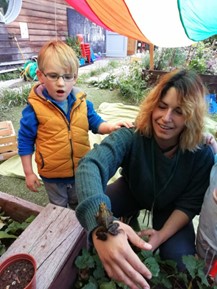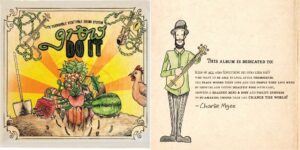Don’t talk about climate change: focus on building nature love instead
For under 7s, the concept of climate change is complex and unnecessary.
Instead, focus on nurturing the love of nature and innate sense of wonder at the world that is the foundation for future engagement.
Spend time looking at the spots of a ladybird. Make a rainbow with water spray.
As Rachel Carson wrote in her wonderful book ‘Sense of Wonder’ in 1965, getting it ‘right’ is not what is important at this age, but instead, a willingness to accompany the child in their exploration of a part of the world around them.[i]
Some places to start:
- Read Rachel Carson’s full essay, ‘The Sense of Wonder’, written about adventures with her young nephew Roger.[ii]
- Look up the work of Patty Born Selly (e.g. https://naturalstart.org/feature-stories/nurturing-childrens-love-animals) and others with expertise in building relationships between children, animals and the natural world. Another good book is ‘A Sense of Place’ (2019) by experienced early years practitioner Annie Davy offers some good practical starting points for early years.[iii]
- Download ‘Making a Mud Kitchen’, a free guide by early years outdoor learning guru Jan White, strategic director of Early Childhood Outdoors, the National Centre for Outdoor Play, Learning and Wellbeing [website], and Liz Edwards, founder of Muddy Faces, another website rich with ideas.
- Equally, the internet is awash with wonderful suggestions for children’s nature activities, and many NGOs, like the Wildlife Trust, National Trust and Earthwatch, provide regularly updated lists of suggestions.

Another great way to ensure a child’s nature enjoyment is nurtured is to find an early year’s setting which has the outdoors and love of nature at its core. Flo’s Nature Nursery in Oxford is a wonderful example of a setting which builds good foundations for a love of and interest in the environment. Read about the nursery’s approach here: https://www.flosoxford.org.uk/our-approach/. To find one near you, you could try an internet search for ‘nature nursery’ plus your location.
Lead by example
Little eyes are watching your every move and creating an idea of what ‘normal’ looks like. Give messages about living a need-focussed life rather than a want-focussed life.[iv] Verbalise and explain the logic for your own pro-environmental behaviours in a simple and accessible way e.g. “we put our waste food in the compost bin, to make food for the plants so they grow” – it can be easy to go through everyday lifer having these conversations in our head, without explaining to our kids.[v]
Do important work to prepare the ground
Resilience starts here, and building strong foundations is a priority. Key messages at this age for any child are that they matter, are seen, heard, understood, and that they are safe. For a great introduction to the work we can do in the early years, watch Jo McAndrews’ 2018 video, Supporting children in the face of climate change.
Actively start building the village, if you haven’t already.
Think about how to support development of the skills and capacities a child will need to thrive in the future they face. Thing like self-regulation; flexibility and adaptability; cooperation and conflict resolution; empathy; a sense of body ownership and consent.
Use music and books to introduce and normalise useful ideas and themes
Sharing music and books with young children can be a joy and we know that reading together provides important foundations for learning and development.[vi] For children who are fortunate enough to encounter books and music at an early age, choice of subject matter presents a great opportunity for building pro-environmental values. Here are some example of great reading material to enjoy with this age group; plus two examples of great music:
Books for this age
‘Hello, Mr World’ by Michael Foreman.[vii] This book is introduces the human-earth relationship, some of our impacts on our home and most importantly, how we can all make a positive difference, but is done in a way which is suitable for very young children, with beautiful illustrations. I read this at my daughter’s nursery, and have not got it back, as it was so popular with the children.
‘Mr World doesn’t feel well.
He’s hot and sweaty and finding it hard to breathe.
Can the doctors find out what’s wrong with him?’
Hello, Mr World by Michael Foreman
‘The Ugly 5’, by Julia Donaldson and Axel Shaeffer. From the team who brought us The Gruffulo, this 2018 picture book is a jubilant celebration of five famously ugly animals. It makes a refreshing change from all the books about the beautiful, cuddly animals, who offer obvious value to humans, and communicates an important message about the inherent value of living things. A great example of how books do not have to be overtly climate focused to be useful in this context.
‘Clean Up!’, by Nathan Bryon, illustrated by Dapo Adeola. A positive, uplifting story about a little girl named Rocket encountering an example of how humans abuse the natural world (in this case, by littering), and finding her own path to initiating empowered action to mitigate the problem. There is a lot to love in this book: the main character is black, when children’s books about the environment suffer from a lack of diversity; Rocket expresses her emotions, modelling giving herself permission to feel, then moving to effective action; and she harnesses the power of her local community. My favourite children’s book for 2020; full review of this book on the LCWO website.[viii]
‘Eco-Wolf and the Three Pigs’, by Laurance Anholt. A humorous rehash of a story many children will know already, in which a loveable laid-back, environmentally aware wolf does battle with three very greedy developer pigs. Supposedly for age 6+, but my four-year-old has been enjoying it for a few years. Currently not available new.
‘We’re Going on a Bear Hunt’, by Michael Rosen. A surprise entry, but Caroline Hickman names this as one of her favourite books for children on overcoming obstacles. The characters repeatedly find things in their way on their walk, but they push through the discomfort and carry on.[ix]
Great music
The Formidable Vegetable Sound System. Our family loves the music of The Formidable Vegetable Sound System, an Australian band offering ‘ecological edutainment you can dance to’. Permaculture-obsessed Australian singer Charlie McGee puts funny, memorable lyrics to infectious, upbeat melodies. Proactive and empowering messages cover a wide range of key basic environmental concepts (including limits, waste, energy, food growing, change, responsibility and cooperation), and are delivered with trademark humour, catchy melodies and irresistible funky beats. The topics covered have weight, without falling back on doom as a means to convey urgency, making it perfect for children.

‘Grow DO IT’ is specifically written for children, and though only a slightly older audience will be able to take full advantage of the words and accompanying storybook style booklet (e.g. 7+), the catchiness and danceability makes it brilliant for small ones too. It is available on the band’s website.
Nick Cope. Musciain and now star of CBeebies, Nick Cope is another firm favourite. Delivered in a gentle humorous manner, catchy melodies carry meaningful themes, which include the impacts of human behaviour on the environment (e.g. ‘Plastic Bag’ and ‘The Polar Bear and the Honey Bee’); enjoyment of the outdoors (‘Let’s take a walk’); and a curiosity about and love for animals (‘Have you heard about Hugh?’). A favourite in Oxford and on the festival circuit, Nick Cope also now hosts an award-winning show on CBeebies, Nick Cope’s Popcast.
Both musicians give voice to the voiceless:
“Do their eyes not see? Do they just not care? They could wake up one morning and they won’t be there…”
From Nick Cope’s ‘The Polar Bear and the Honey Bee’ (Cope, 2018)
“See I give you
Everything you need
yet still you want more
You’re falling over yourselves with greed,
It is time I remind you
to exercise restraint
because if there’s one thing you should know
it’s infinite, I ain’t.”
The Earth talks to us in ‘Limits’, by the Formidable Vegetable Sound System (McGee, 2013).
Play and have fun!
Children learn through play and it is essential to development; playing and having fun together builds connection, and those all-important trust relationships which are so important going forwards.
| PREVIOUS SECTION | NEXT SECTION |